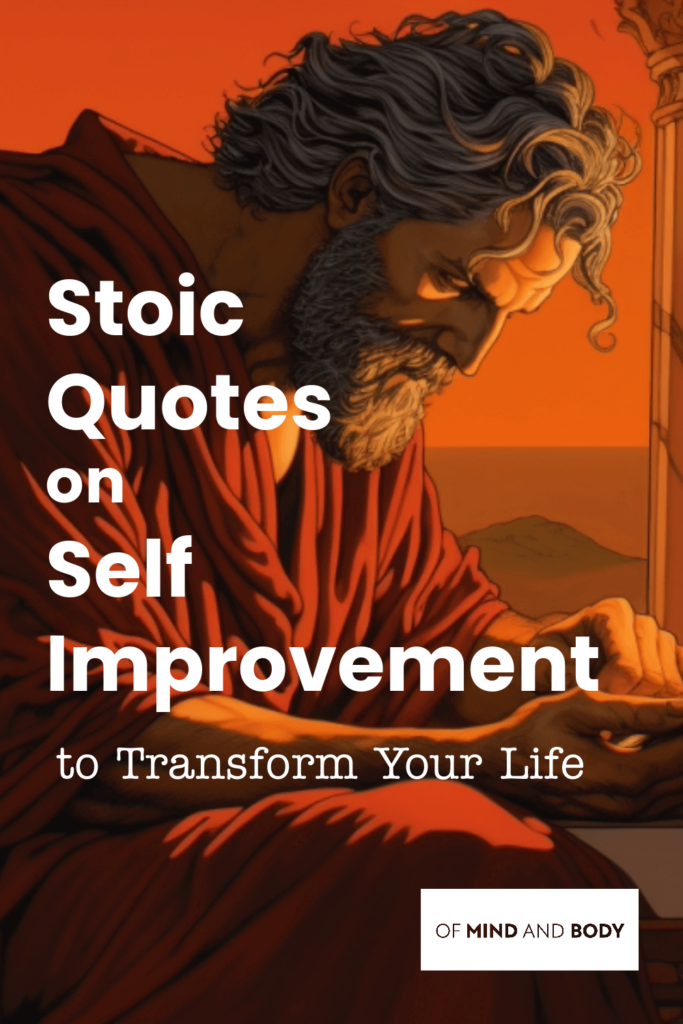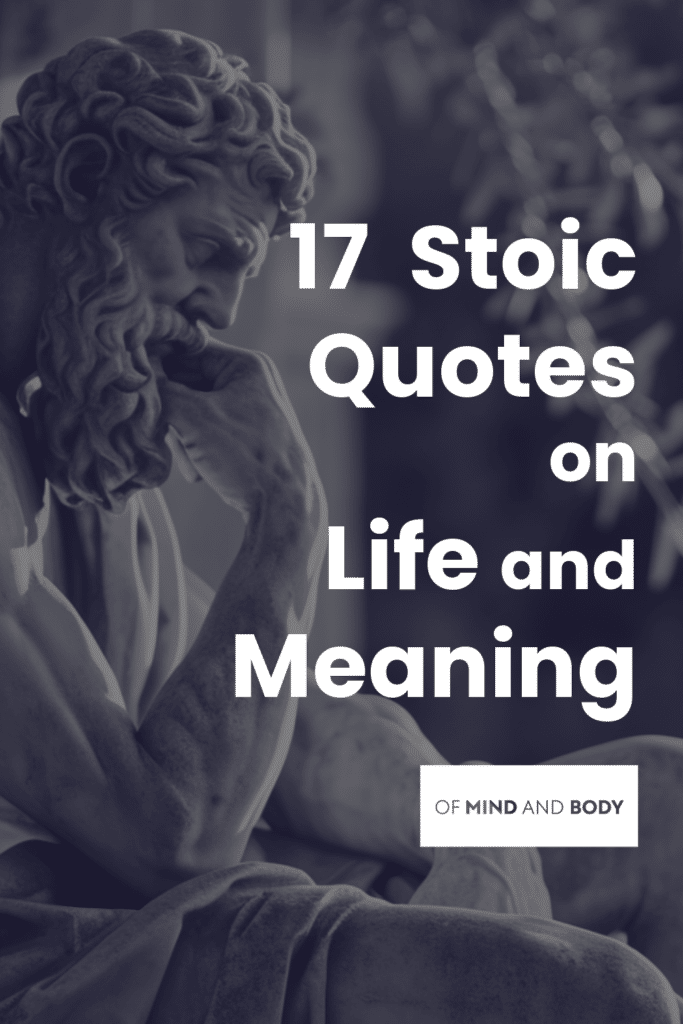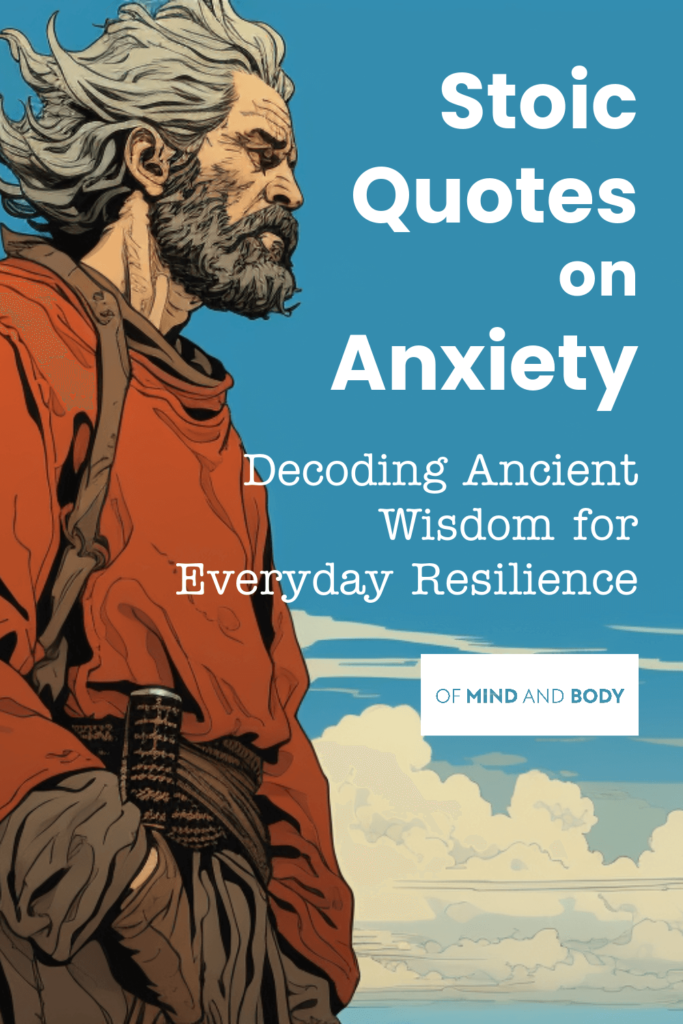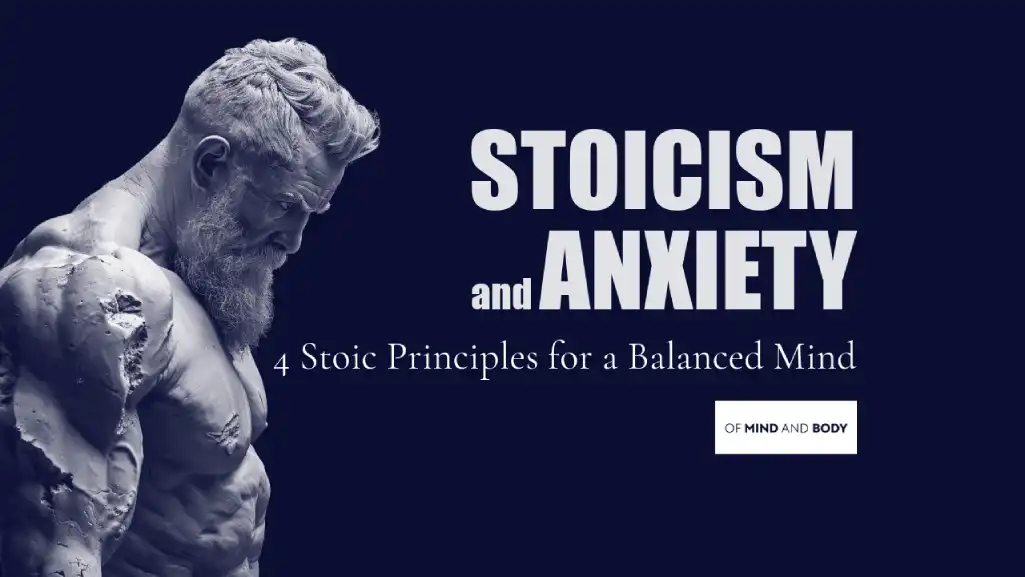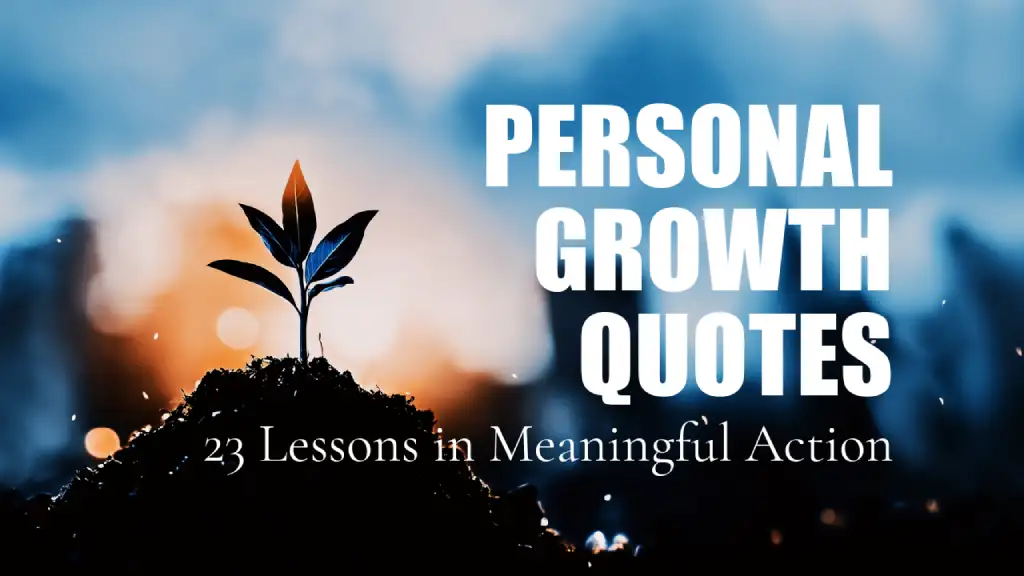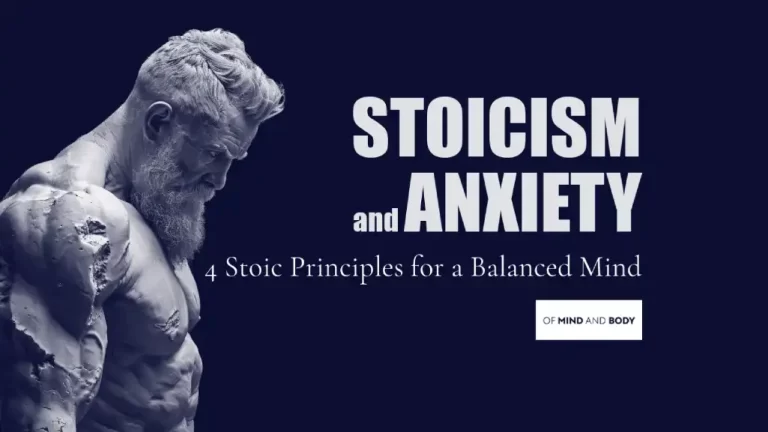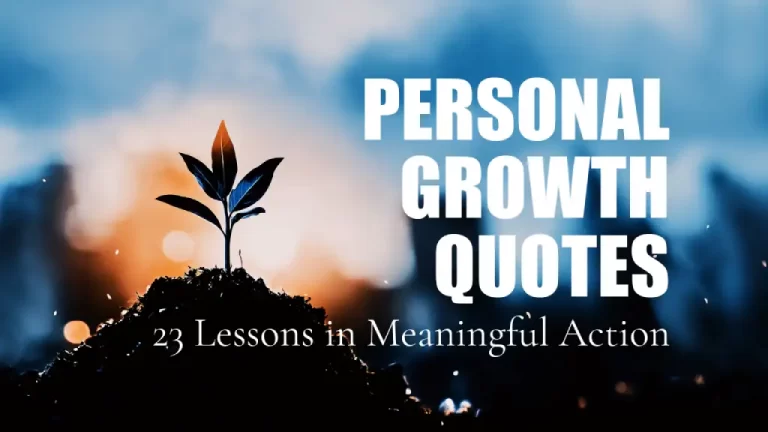
Welcome to a journey through the timeless wisdom of Stoicism, a philosophy that has guided individuals towards inner strength and tranquillity for centuries. In this article, we delve into 24 powerful Stoic quotes, each offering profound insights on the art of self–control and the power of perspective.
These ancient words, spoken by Stoic philosophers like Marcus Aurelius, Seneca, and Epictetus, resonate even in our modern world, providing practical guidance for those seeking to navigate life’s complexities with grace and resilience.
As we explore each quote, we uncover not just the depth of their wisdom, but also their relevance and application in our everyday lives. Whether you are new to Stoicism or a practising Stoic looking to deepen your understanding, these quotes promise to enlighten, challenge, and inspire you on your path to personal growth, self–control and inner peace.
1 – Awareness
- “We are more often frightened than hurt; and we suffer more from imagination than from reality.” – Seneca
- “You have power over your mind – not outside events. Realise this, and you will find strength.” – Marcus Aurelius
- “We cannot choose our external circumstances, but we can always choose how we respond to them.” – Epictetus
- “It is not what happens to you, but how you react to it that matters.” – Epictetus
- “If you are distressed by anything external, the pain is not due to the thing itself, but to your estimate of it; and this you have the power to revoke at any moment.” – Marcus Aurelius
- “There is only one way to happiness and that is to cease worrying about things which are beyond the power of our will.” – Epictetus
- “When we are no longer able to change a situation, we are challenged to change ourselves.” – Viktor Frankl
2 – Realisation
- “It is the power of the mind to be unconquerable.” – Seneca
- “No man is free who is not master of himself.” – Epictetus
- “How long are you going to wait before you demand the best for yourself?” – Epictetus
- “Everything we hear is an opinion, not a fact. Everything we see is a perspective, not the truth.” – Marcus Aurelius
- “Seek not the good in external things; seek it in yourselves.” – Epictetus
- “You always own the option of having no opinion. There is never any need to get worked up or to trouble your soul about things you can’t control.” – Marcus Aurelius
- “To bear trials with a calm mind robs misfortune of its strength and burden.” – Seneca
- “It is not the man who has too little, but the man who craves more, that is poor.” – Seneca
- “Attach yourself to what is spiritually superior, regardless of what other people think or do. Hold to your true aspirations no matter what is going on around you.” – Epictetus
3 – Embodiment
- “Don’t explain your philosophy. Embody it.” – Epictetus
- “Waste no more time arguing about what a good man should be. Be one.” – Marcus Aurelius
- “The best revenge is to be unlike him who performed the injustice.” – Marcus Aurelius
- “Don’t be overheard complaining… Not even to yourself.” – Marcus Aurelius
- “If it is not right, do not do it, if it is not true, do not say it.” – Marcus Aurelius
- “The greatest remedy for anger is delay.” – Seneca
- “First say to yourself what you would be; and then do what you have to do.” – Epictetus
Stoic Quotes on Control – Part 1 : Awareness
In the ‘Awareness‘ section, we explore Stoic teachings on mindfulness and self-awareness. These Stoic quotes illuminate our understanding of personal circumstances and inner thoughts, guiding us towards greater clarity about what we can control in ourselves and our interactions with the world. This foundational awareness sets the stage for deeper introspection and personal growth.
“We are more often frightened than hurt; and we suffer more from imagination than from reality.”
Seneca

The Wisdom Behind the Words:
Seneca’s quote addresses the human tendency to exaggerate fears and worries in our minds, often creating more suffering than the actual event warrants. This insight is crucial in understanding how much of our distress is self-generated. It suggests that our fears, when scrutinised, are often less daunting than our imagination makes them out to be. Seneca is urging us to differentiate between the objective reality of a situation and the subjective, often magnified, fears that we project onto it.
Everyday Applications:
To apply this wisdom, we can practise mindfulness and self-awareness to recognise when fears are being amplified by imagination. When facing a daunting situation, question whether the fear is based on fact or fiction. Grounding ourselves in the present moment and focusing on factual information can significantly reduce anxiety.
“You have power over your mind – not outside events. Realise this, and you will find strength.”
Marcus Aurelius
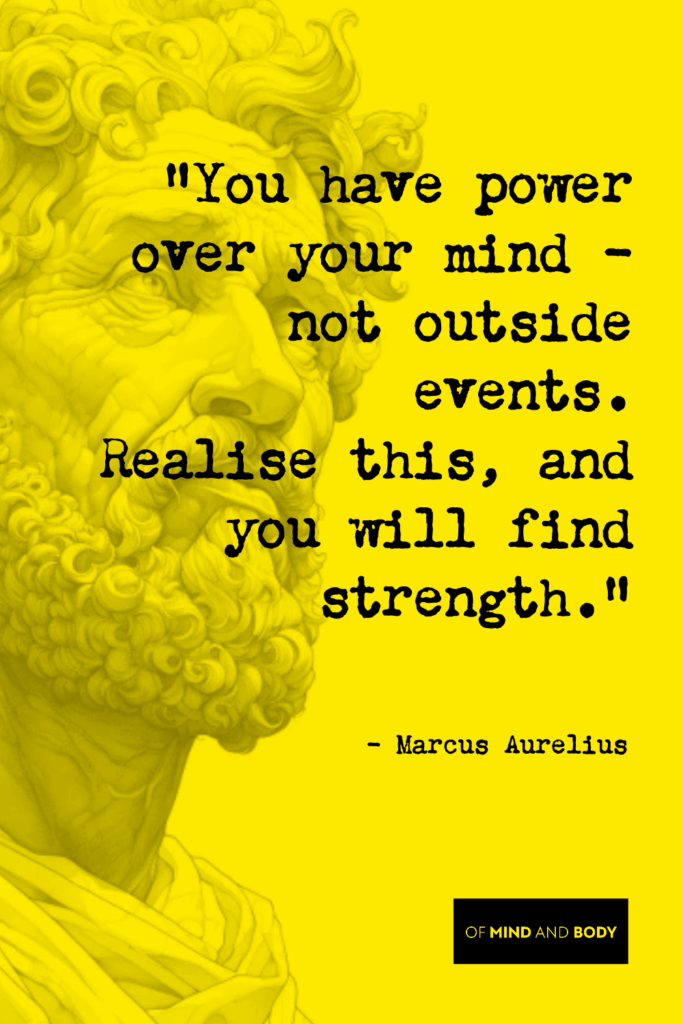
The Wisdom Behind the Words:
Marcus Aurelius emphasises the domain where true control lies: within our minds. These Stoic quotes reminds us that while we cannot control external events, we have the ultimate authority over our thoughts and reactions. It’s a call to recognise and harness the inner strength that comes from this control. By understanding this, we can cultivate resilience against the unpredictability of life.
Everyday Applications:
In daily life, this philosophy can be applied by focusing on our internal responses rather than external circumstances. For instance, when facing a traffic jam, instead of succumbing to frustration over the uncontrollable delay, we can choose to listen to a podcast or music, turning the situation into a more positive experience. This shift in focus from external events to internal response is empowering and can transform our experience of life.
“We cannot choose our external circumstances, but we can always choose how we respond to them.”
Epictetus
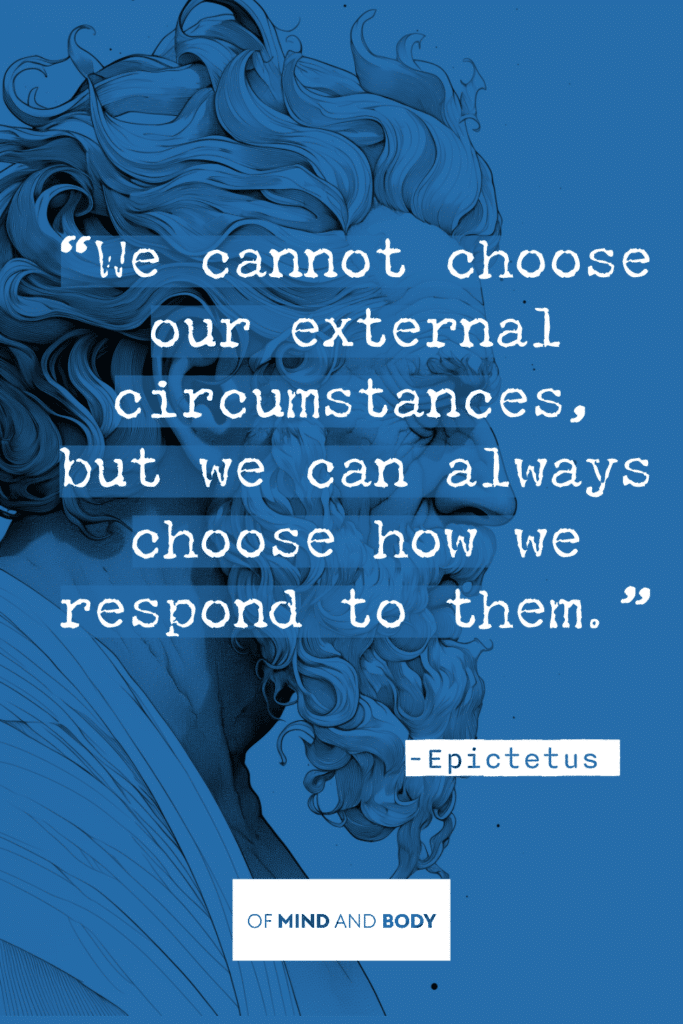
The Wisdom Behind the Words:
Epictetus brings to light the fundamental Stoic belief in the power of choice. While external circumstances are often beyond our control, our reaction to them is entirely within our grasp. This quote is a powerful reminder that our freedom and power lie not in what happens to us but in how we choose to respond. It underscores the importance of attitude, perspective, and the decisions we make in the face of life’s inevitable challenges.
Everyday Applications:
Applying this wisdom means actively choosing our responses to the challenges we face. For example, when confronted with a difficult work project, instead of feeling overwhelmed, we can choose to see it as an opportunity to learn and grow. By focusing on positive aspects and adopting a solution-oriented mindset, we can transform our experience of challenging situations.
“It is not what happens to you, but how you react to it that matters.”
Epictetus

The Wisdom Behind the Words:
Similar to the previous quote, this statement by Epictetus highlights the significance of our reactions over the events themselves. It’s a profound reminder that the quality of our lives is determined more by our internal state than by external circumstances. This quote encourages a proactive rather than reactive approach to life, urging us to take responsibility for our emotional and mental well-being.
Everyday Applications:
In practical terms, this means taking a moment to pause and choose our response in any given situation. For instance, receiving criticism can be an opportunity for self–reflection and growth, rather than a trigger for defensiveness or self-doubt. By consciously choosing constructive responses, we shape our experiences and, ultimately, our life’s trajectory.
“If you are distressed by anything external, the pain is not due to the thing itself, but to your estimate of it; and this you have the power to revoke at any moment.”
Marcus Aurelius
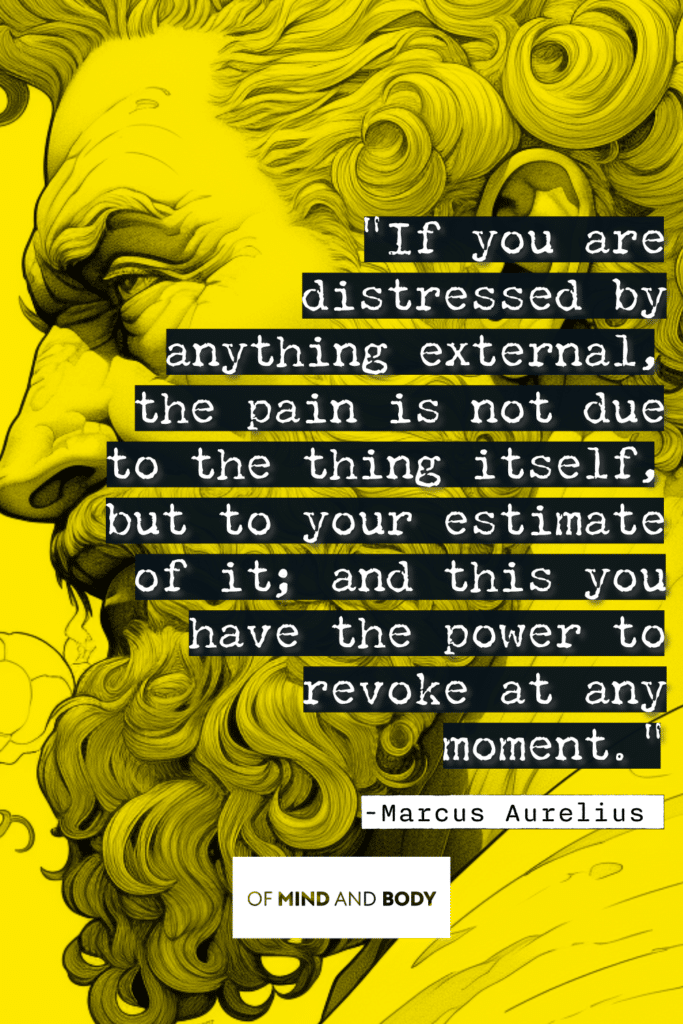
The Wisdom Behind the Words:
Marcus Aurelius teaches us that our distress comes not from external events, but from our perceptions and judgments of them. This profound insight highlights the power of perspective in shaping our emotional responses. It implies that by changing our internal narratives and beliefs about a situation, we can alter our emotional experience of it. Aurelius is essentially advocating for a form of cognitive reframing, where the focus is on internal transformation rather than external change.
Everyday Applications:
To apply this, when feeling upset or distressed by an external event, pause and examine the thoughts and beliefs fuelling these emotions. Ask yourself if there’s a more positive or neutral way to view the situation. For instance, if a friend cancels plans, instead of interpreting it as a personal slight, consider that they might have a valid reason. Changing our internal narrative can significantly reduce unnecessary suffering.
“There is only one way to happiness and that is to cease worrying about things which are beyond the power of our will.”
Epictetus

The Wisdom Behind the Words:
Epictetus points out that the pursuit of happiness is often misguided when it’s focused on external circumstances. He suggests that true contentment is found when we release our preoccupation with things we cannot control. This quote encourages a shift from external to internal, advocating for a focus on our actions, choices, and attitudes, which are within our realm of influence.
Everyday Applications:
In practical terms, this means actively recognising and letting go of worries about things outside our control. Instead, concentrate on actions and thoughts that you can control. For example, rather than worrying about the outcome of a job interview, focus on preparing thoroughly and presenting yourself authentically. This shift in focus can lead to a more peaceful and contented state of mind.
“When we are no longer able to change a situation, we are challenged to change ourselves.”
Viktor Frankl
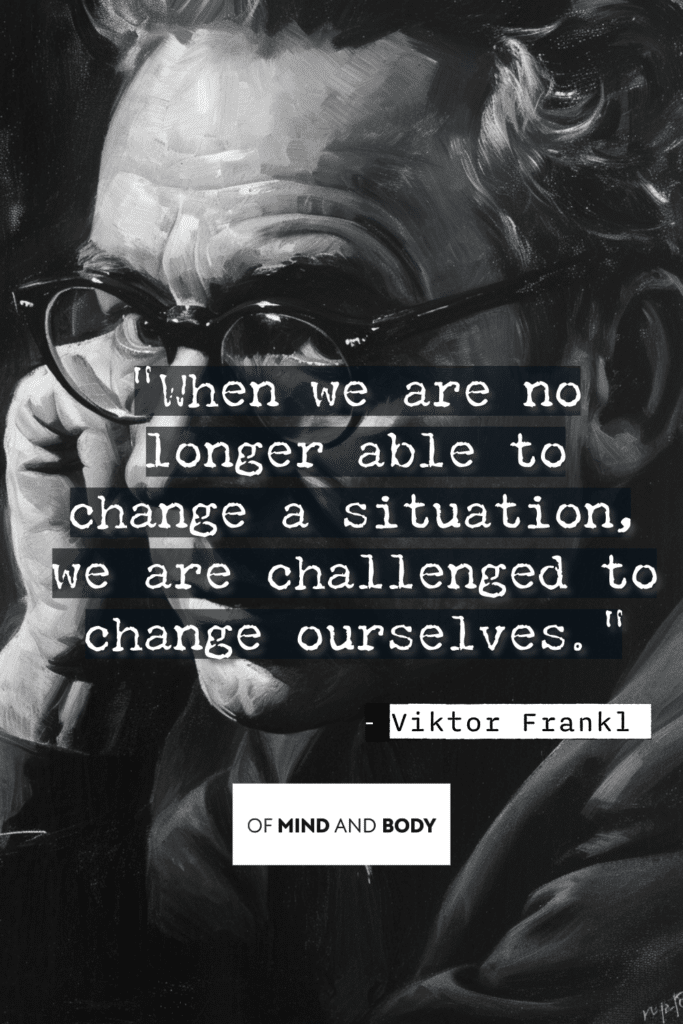
The Wisdom Behind the Words:
Viktor Frankl, drawing inspiration from Stoicism, highlights the transformative power of accepting unchangeable situations. This Stoic quotes words acknowledge that while we can’t always control our circumstances, we have the opportunity to grow and evolve internally. It’s a reminder that personal development often occurs in the face of adversity and that our responses to challenging situations define our character.
Everyday Applications:
When faced with an unchangeable situation, such as a loss or a global event, focus on how you can grow from the experience. This might involve developing resilience, finding new meanings, or learning to embrace uncertainty. For instance, during a crisis, one can focus on cultivating compassion and understanding, both for oneself and others.
Stoic Quotes on Control – Part 2 : Realisation
Our ‘Realisation’ section offers a shift in perspective, as these Stoic quotes challenge and re-frame our view of reality and the nature of control. These insights encourage us to see beyond external circumstances to the true power of our responses. Embracing these teachings fosters a proactive engagement with life, equipping us with a clearer, more empowered worldview.
“It is the power of the mind to be unconquerable.”
Seneca
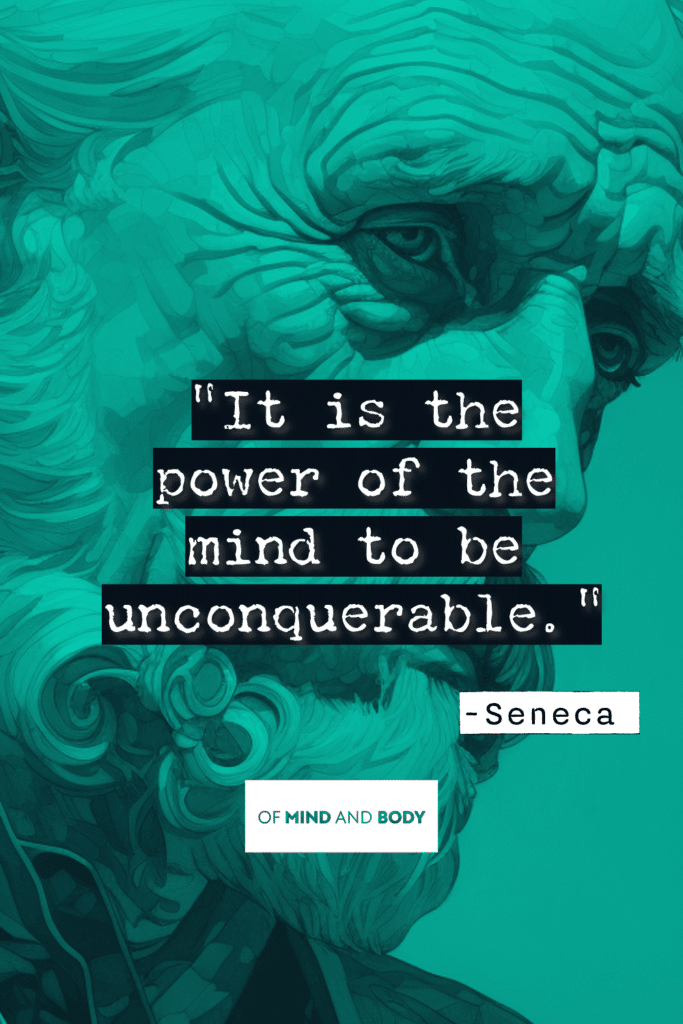
The Wisdom Behind the Words:
Seneca is emphasising the immense strength and resilience of the human mind. This quote suggests that regardless of external circumstances, a well-cultivated mind can remain steadfast and unshaken. It’s a powerful reminder of our capacity for mental fortitude and the importance of nurturing our inner selves.
Everyday Applications:
To embody this wisdom, practise mental and emotional self–care regularly. This could include meditation, journaling, or engaging in activities that foster resilience and inner peace. For example, when facing a challenging situation, instead of succumbing to despair, one can turn to introspection and constructive self-dialogue to maintain mental composure.
“No man is free who is not master of himself.”
Epictetus
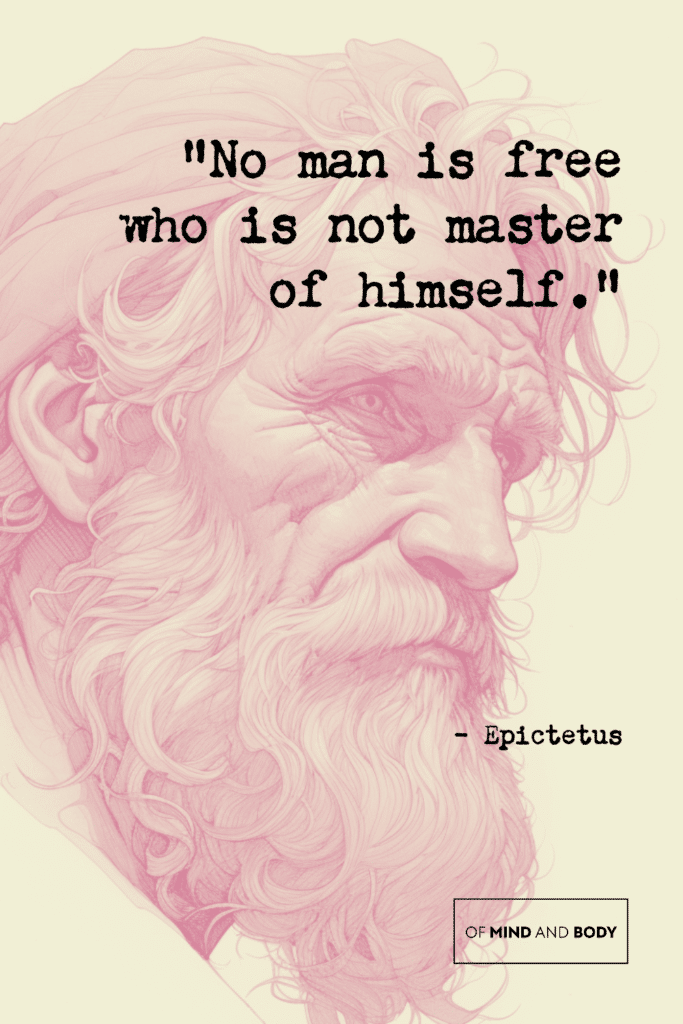
The Wisdom Behind the Words:
Epictetus underscores the essential Stoic belief that true freedom comes from self-mastery. These Stoic quotes suggests that external circumstances do not determine our freedom; rather, it is our ability to control our responses, emotions, and decisions that grants us true autonomy. Self-mastery involves discipline, self-awareness, and the ability to act in accordance with one’s principles, regardless of external pressures or temptations.
Everyday Applications:
In everyday life, this principle can be applied by exercising discipline in our choices and actions. For example, when faced with a challenging situation that triggers anger or frustration, practising self–control and choosing a measured response reflects mastery over oneself. Developing habits that align with personal values and goals also exemplifies this form of freedom.
Download your FREE Values and Beliefs eBook here.
“How long are you going to wait before you demand the best for yourself?”
Epictetus
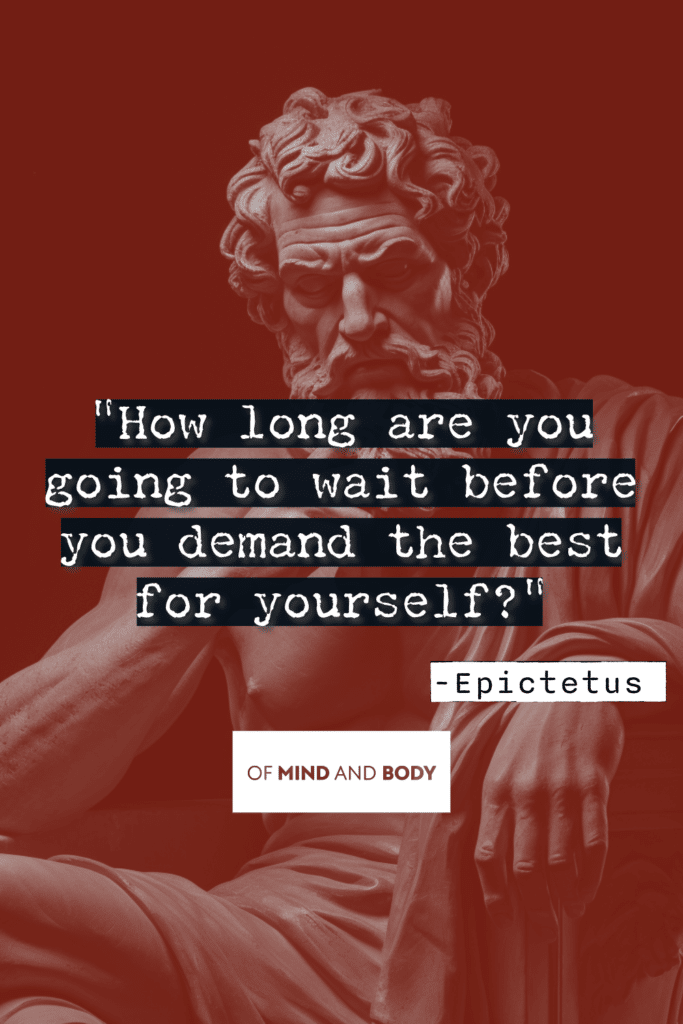
The Wisdom Behind the Words:
Epictetus challenges us to confront our own complacency. This quote is a call to action, urging us to stop procrastinating on our personal growth and to start actively pursuing the best version of ourselves. It implies that self–improvement and the pursuit of excellence are choices that we must consciously make, rather than waiting for external circumstances to change.
Everyday Applications:
To apply this wisdom, set high standards for yourself in various aspects of your life, whether it’s in your career, personal relationships, health, or hobbies. Reflect on areas where you might be settling for less and take concrete steps to elevate your standards. For instance, in your professional life, this could mean seeking additional training or taking on new challenges that push you out of your comfort zone.
“Everything we hear is an opinion, not a fact. Everything we see is a perspective, not the truth.”
Marcus Aurelius
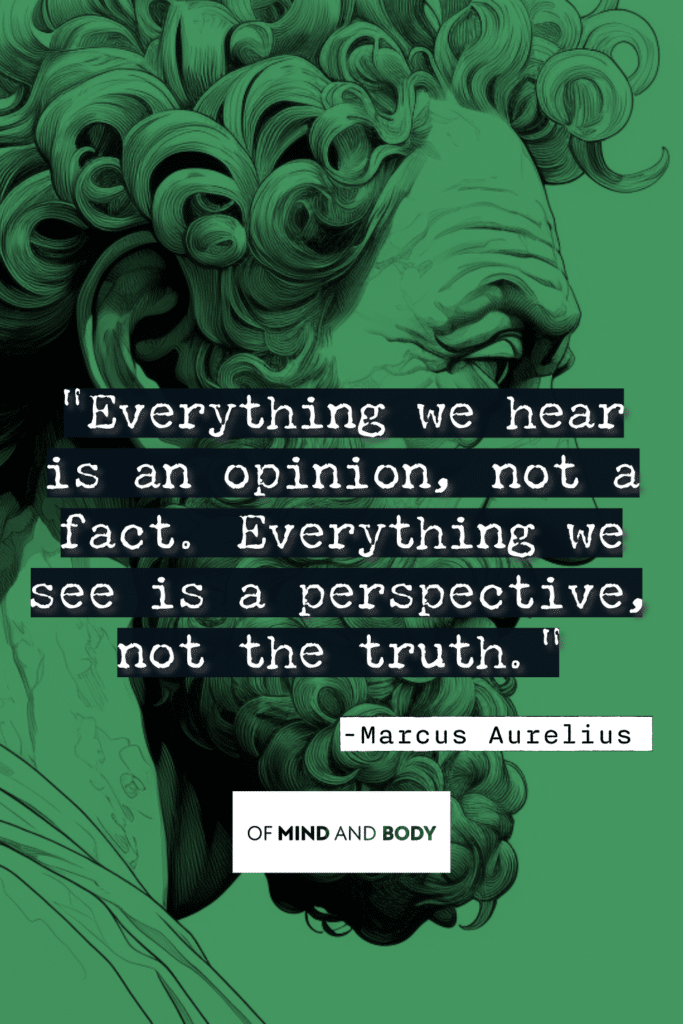
The Wisdom Behind the Words:
Marcus Aurelius reminds us of the subjective nature of our perceptions and the information we receive. This quote encourages a critical examination of our beliefs and assumptions, recognising that what we perceive as truth is often influenced by our personal biases and limited perspectives. It’s a call to maintain intellectual humility and openness to different viewpoints.
Everyday Applications:
In practice, this means approaching information and situations with a questioning mind. When forming opinions or making decisions, consider the possibility that there might be other valid perspectives. For example, in a disagreement, try to understand the other person’s viewpoint, acknowledging that your perspective is not the sole version of the truth.
“Seek not the good in external things; seek it in yourselves.”
Epictetus
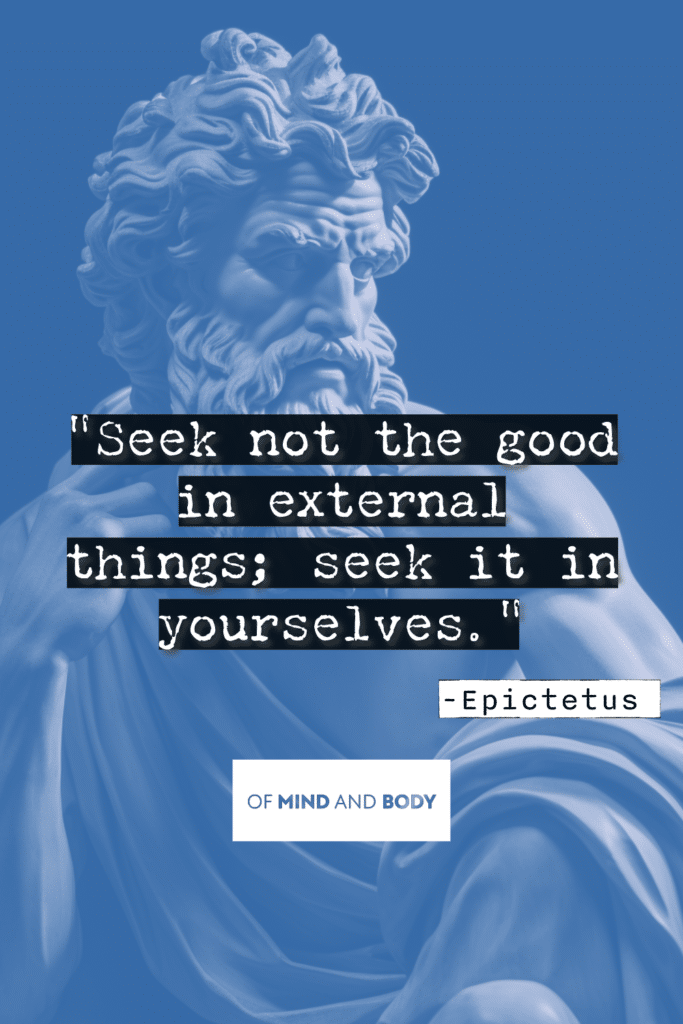
The Wisdom Behind the Words:
Epictetus advises us to turn our search for fulfilment and virtue inward, rather than seeking it in external achievements or material possessions. This quote emphasises the Stoic belief that true contentment and moral excellence come from within. It suggests that relying on external sources for happiness is precarious and ultimately unfulfilling.
Everyday Applications:
This can be applied by focusing on personal development and internal qualities such as integrity, resilience, and compassion. For example, instead of deriving your sense of worth from career success or social status, cultivate self-esteem and fulfilment through personal achievements, self-care, and meaningful relationships.
“You always own the option of having no opinion. There is never any need to get worked up or to trouble your soul about things you can’t control.”
Marcus Aurelius
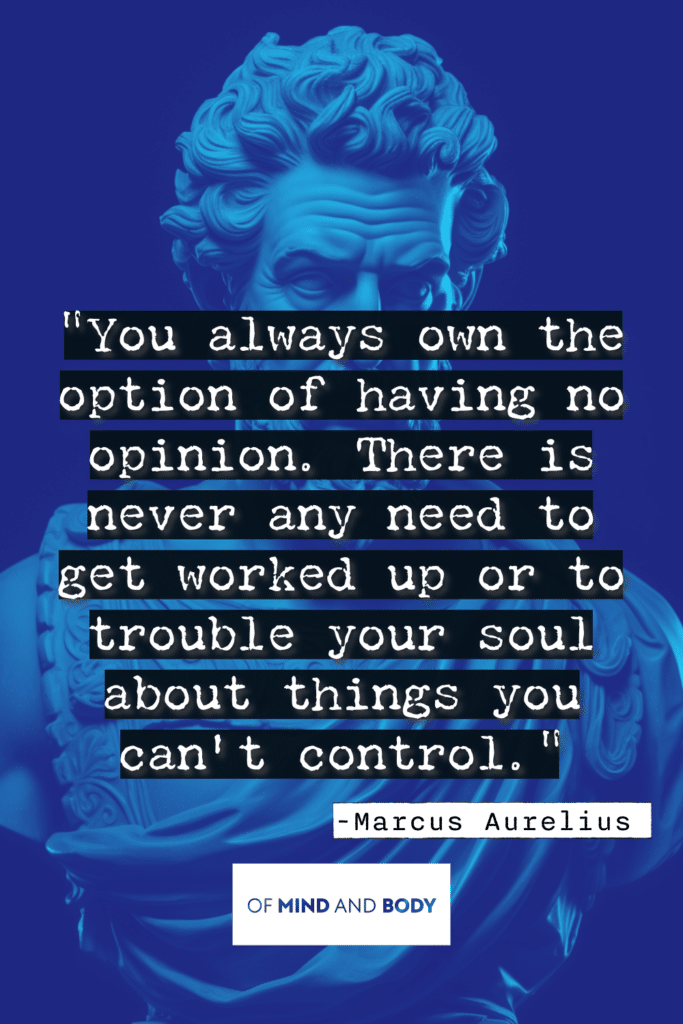
The Wisdom Behind the Words:
Marcus Aurelius presents a liberating perspective: the choice to remain neutral or withhold judgement, especially on matters beyond our control. This approach reduces unnecessary mental and emotional strain. The quote reflects the Stoic view of focusing energy only on what can be influenced or changed, fostering inner peace and resilience.
Everyday Applications:
In daily life, practise discerning when to engage and when to withhold opinion or emotional investment, especially in situations outside your control. For example, in heated discussions on topics where you have no influence or stake, choosing not to form a strong opinion can conserve mental energy and maintain tranquillity.
“To bear trials with a calm mind robs misfortune of its strength and burden.”
Seneca

The Wisdom Behind the Words:
Seneca teaches that the way we react to adversity can greatly diminish its impact on us. By maintaining composure and a clear mind during difficult times, we reduce the power these challenges have over our emotional state. This Stoic principle emphasises resilience and the power of a balanced, rational approach to life’s inevitable struggles.
Everyday Applications:
When facing challenges, strive to remain calm and rational. Instead of letting emotions dictate your reactions, approach problems logically and seek constructive solutions. For instance, in a crisis, staying calm can help you assess the situation more accurately and make more effective decisions.
“It is not the man who has too little, but the man who craves more, that is poor.”
Seneca

The Wisdom Behind the Words:
Seneca highlights the difference between material scarcity and insatiability. This quote reflects the Stoic ideal that true richness comes from contentment and simplicity, not from the accumulation of material possessions. It’s a critique of endless desire and a reminder that peace comes from appreciating what we already have.
Everyday Applications:
Practice gratitude and contentment in your life. Focus on appreciating what you have, rather than constantly seeking more. This could mean taking time each day to reflect on the things you’re thankful for, which can lead to a greater sense of fulfilment and reduce the urge for constant acquisition.
“Attach yourself to what is spiritually superior, regardless of what other people think or do. Hold to your true aspirations no matter what is going on around you.”
Epictetus

The Wisdom Behind the Words:
Epictetus advises us to focus on higher spiritual or moral goals, irrespective of external opinions or trends. This quote encourages us to stay true to our core values and principles, finding guidance and strength from within. It’s a call to personal integrity and authenticity, emphasising the importance of internal validation over external approval.
Everyday Applications:
Live according to your values and beliefs, even when they aren’t popular or understood by others. This could involve making choices that align with your ethical standards, even if they go against societal norms or expectations. For instance, pursuing a career or hobby that fulfils you personally, even if it’s not conventionally esteemed, is a way to honour your true self.
Download your FREE Values and Beliefs eBook here.
Stoic Quotes on Control – Part 3 : Embodiment
In the ‘Embodiment’ section, we focus on putting Stoic principles into practice. Here, the philosophy transcends theory, guiding us to live out the virtues of Stoicism in our daily actions and decisions. These quotes inspire us to integrate resilience, integrity, and equanimity into our lives, embodying the true essence of Stoic wisdom.
“Don’t explain your philosophy. Embody it.”
Epictetus
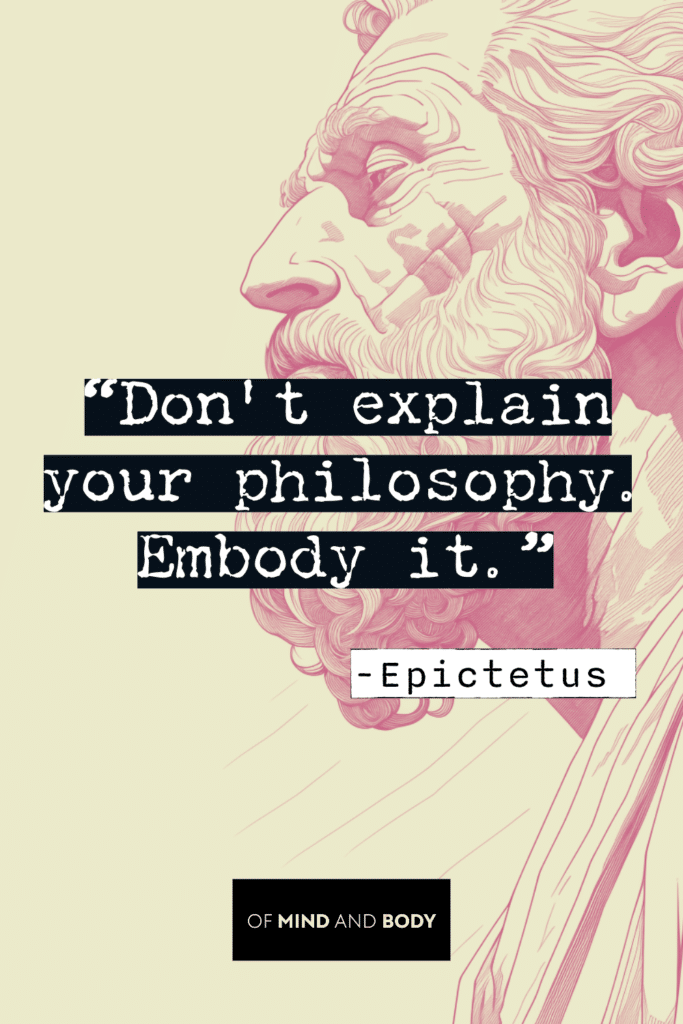
The Wisdom Behind the Words:
Epictetus emphasises the importance of living out one’s beliefs and values rather than merely talking about them. This quote underscores the Stoic principle of authenticity and integrity, where the true test of one’s philosophy is in its application to daily life. It’s a reminder that actions speak louder than words, and the most effective way to demonstrate one’s beliefs is through consistent, practical application.
Everyday Applications:
Put your principles into action in everyday situations. If you value kindness, make a conscious effort to be compassionate in your interactions. If you believe in hard work and perseverance, let these qualities shine through in your professional endeavours. Living your philosophy makes it a tangible and impactful part of your life.
Download your FREE Values and Beliefs eBook here.
“Waste no more time arguing about what a good man should be. Be one.”
Marcus Aurelius

The Wisdom Behind the Words:
Marcus Aurelius calls for action over discourse when it comes to virtue and morality. This quote is a prompt to shift from theoretical discussions about goodness to the practical implementation of good actions. It highlights the Stoic belief in the importance of living according to one’s principles and virtues.
Everyday Applications:
Focus on demonstrating your moral beliefs through your actions. Instead of engaging in endless debates about right and wrong, choose to act in ways that reflect your understanding of goodness. For example, if you believe in generosity, actively look for opportunities to help others in need.
“The best revenge is to be unlike him who performed the injustice.”
Marcus Aurelius

The Wisdom Behind the Words:
In this quote, Marcus Aurelius suggests that the most effective way to deal with injustice is not through retaliation, but by maintaining one’s ethical standards. It speaks to the idea of not letting others’ wrongdoings corrupt your own character and values. The quote reflects a deep understanding of personal integrity and the power of setting a positive example.
Everyday Applications:
When wronged or treated unfairly, resist the temptation to respond in kind. Choose instead to uphold your values and respond with integrity. For instance, if someone is rude to you, maintain your composure and respond politely or choose not to engage at all, thus preserving your dignity and peace of mind.
“Don’t be overheard complaining… Not even to yourself.”
Marcus Aurelius
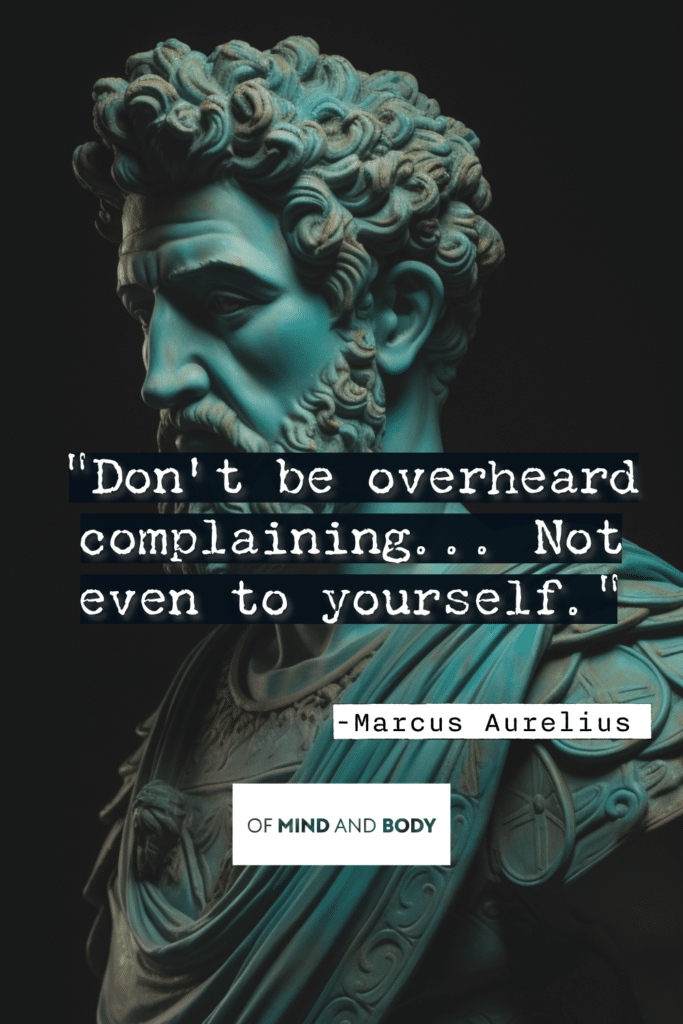
The Wisdom Behind the Words:
Marcus Aurelius advises against indulging in complaints, as it can foster a negative mindset and detract from constructive problem-solving. This quote emphasises the Stoic view of focusing on action and acceptance rather than dwelling on grievances. It’s a reminder that complaining, even internally, can perpetuate a sense of victimhood and helplessness.
Everyday Applications:
Practise mindful awareness of your thoughts and speech. When you catch yourself complaining, internally or aloud, redirect your focus towards finding solutions or accepting what cannot be changed. For example, instead of complaining about a difficult colleague, consider ways to effectively communicate or adapt to the situation.
“If it is not right, do not do it, if it is not true, do not say it.”
Marcus Aurelius

The Wisdom Behind the Words:
Marcus Aurelius emphasises the importance of integrity and honesty in both action and speech. This quote reflects the Stoic principle of living in alignment with one’s values and truth. It’s a call to self–reflection and consistency, ensuring that our actions and words are congruent with what we believe to be right and true.
Everyday Applications:
In daily life, this means being mindful about your actions and words. Before speaking or acting, consider if what you’re about to do or say aligns with your principles and the truth as you understand it. For instance, in professional settings, this could involve speaking up against unethical practices or making decisions that are ethically sound, even if they are not the easiest or most popular choices.
“The greatest remedy for anger is delay.”
Seneca

The Wisdom Behind the Words:
Seneca offers a practical strategy for managing anger – the act of pausing before reacting. This delay allows for emotional responses to cool and for reason to regain control. It’s a reminder that immediate reactions are often driven by raw emotion rather than rational thought, and that taking a moment can change the course of our response significantly.
Everyday Applications:
When feeling angry or upset, practice taking a step back from the situation. Give yourself time to breathe and think before responding. This could mean counting to ten before replying in a heated conversation, or allowing yourself some time to process your feelings before addressing a conflict.
“First say to yourself what you would be; and then do what you have to do.”
Epictetus
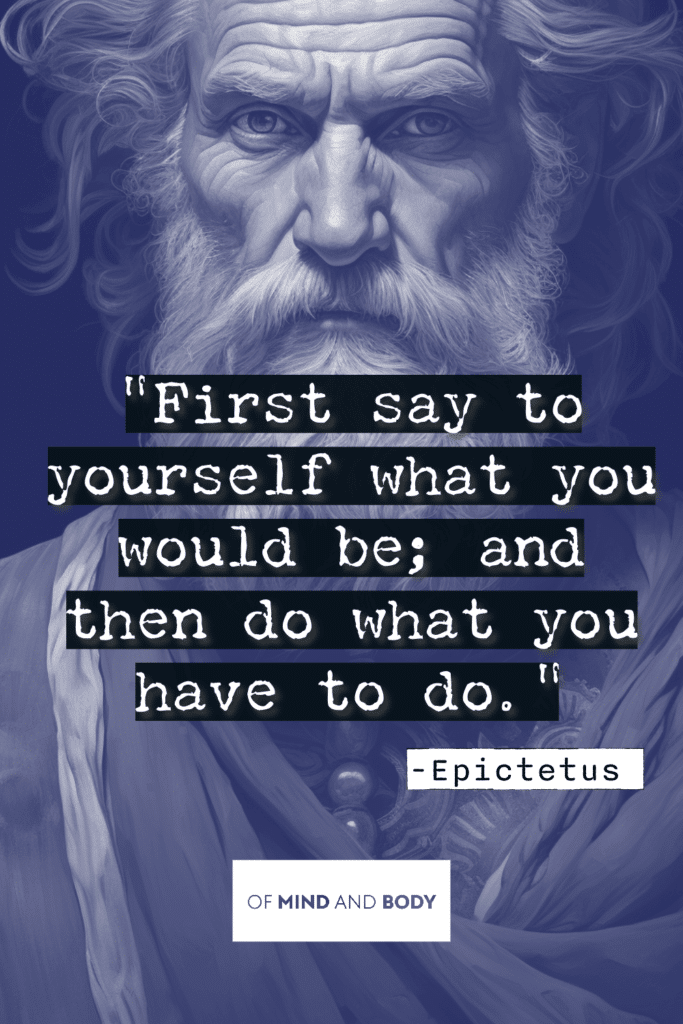
The Wisdom Behind the Words:
Epictetus highlights the importance of self–awareness and intention in personal development. This quote encourages us to first define our ideals and aspirations and then align our actions accordingly. It’s about having a clear vision of who we want to be and then actively working towards that vision through our choices and behaviours.
Everyday Applications:
Set clear personal goals and values for yourself. Whether it’s becoming more compassionate, more disciplined, or more skilled in a certain area, let these aspirations guide your daily actions. For example, if you aim to be healthier, incorporate exercise and nutritious food into your daily routine.
Download your FREE Values and Beliefs eBook here.
Have you enjoyed reading this? If you have, then I encourage you to delve into some of our other articles below:
Final Thoughts
As we conclude our exploration of Stoic wisdom, it’s clear that these ancient teachings offer more than just philosophical insights—they provide a roadmap for living with purpose, resilience, and inner peace. From cultivating awareness of our thoughts and emotions to re-framing our understanding of the world, and ultimately embodying the virtues of Stoicism in our daily lives, each step on this journey brings us closer to a more fulfilled and balanced existence.
These Stoic principles, timeless in their relevance, encourage us to navigate life’s complexities with grace and to find strength in the face of adversity. May the wisdom of the Stoics continue to inspire and guide us as we pursue our paths, reminding us that true contentment and freedom lie within our grasp, shaped by our perceptions, decisions, and actions.





